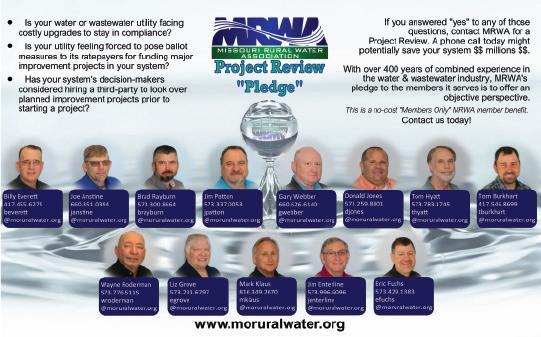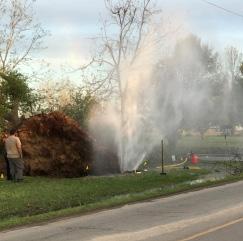
4 minute read
Lessons Learned: 2020’s Hindsight
LESSONS LEARNED: 2020’s Hindsight
Elizabeth Grove, MRWA Management Circuit Rider
Advertisement
The recent COVID-19 outbreak and subsequent emergency declaration by Governor Parsons brought forth a number of issues that utility systems were having to deal with as restrictions on movement, operations, and interacting with customers were put in place.
Besides the operational issues of keeping the staff working safely, insuring that staff were properly protected during interactions with customers and other staff, and planning for the potential of staff contracting the virus and being unable to work, other managerial/governing issues arose that many systems were not prepared to address. Add to this trying to keep up with the actions of the federal government in terms of paid time off for employees, funding through stimulus packages for local governments/employers, etc., there was a lot going on that was, at times, overwhelming.
This article will focus on those issues that impacted the board and policies of the system. Some questions I received during this time included: • “How do we conduct a board meeting if we are restricted from meeting in groups?”
“How do we pay bills if we are not allowed to have a board meeting?”
“Are we prohibited from disconnecting a customer for non-payment during the declared state of emergency?”
All these questions require policy making at the board level. The recent COVID-19 emergency has brought these issues to the forefront and boards need to plan for future incidences based on lessons learned.
In the instance where the board is not able to meet due to emergency situations, is there authority granted to the board president and/or the system management to address issues that must be addressed? For example, routine expenses such as utilities, payroll, etc., must be paid each month. Does the mayor, board president, or system manager have the authority to pay these routine expenses without board approval during an emergency? A policy should be developed to address these situations. When is it permitted, how will it be monitored, and how will it be reported? The last thing you want is for the electricity to be shut off for non-payment during a crisis!
Another frequent question I received was “Can we disconnect a customer’s water service for non-payment?” The answer is yes, you can. The declared COVID-19 emergency did not require that utilities be kept on for all customers. However, many utilities adopted a “no-disconnect” policy during the emergency as many customers experienced job loss and thus, loss of income during this time. When asked this question, my response was always “What is the board’s policy on this?” The response I received was “We don’t have a policy.” Again, the board should develop a policy on whether an emergency no-disconnect policy is needed, under what circumstances it should be applied, and who has the authority to invoke and implement it.
The same is true for a “no late fees assessed” policy. Does the system have a policy on when to cease assessing late fees, who has the authority to invoke the policy, and what reporting requirements will the board require?
Perhaps the biggest concern of systems was how to conduct a board meeting when social distancing and
prohibition of group meetings is in place. Another situation where a board meeting may be difficult is during a natural disaster. A tornado rips through the community and physically getting the board together is a challenge. Is a procedure in place where a virtual meeting is possible?
The issue that utilities must be careful of when conducting virtual meetings is staying in compliance with Missouri Sunshine Law. All public meetings (except for closed sessions) must be accessible by the public. How do you do that while conducting a virtual meeting? Many of us have had a teleconference meeting or perhaps a meeting where just one or two board members are participating via telephone. So long as the public has a means to listen to the meeting, all is good. The other point to remember is that in order to comply with the Sunshine Law, elected officials must be physically present or attending via videoconferencing to cast a roll call vote. So, unless a vote is a “voice” vote, meetings held solely over the telephone can be problematic.
Does your board need to have training on accessing and using video conferencing platforms? There are so many platforms available for a videoconference these days (Zoom, WebEx, Skype, Google Meet, etc.) that having a videoconference meeting is extremely accessible. The participant needs a way to connect (computer, tablet, smartphone) and most of the platforms are free or very reasonably priced. A little training with board members may be needed, but it can be done. The public can also log in to a meeting and observe, thus satisfying the Sunshine Law. There are tips and tricks to a successful video meeting and participants will get better at it the more it is used. In this day and age, videoconferencing is very accessible. Also, do not assume your board members are “way too technology adverse” to use videoconferencing. I think you will be surprised.
Emergency planning is something we all need to do. However, such planning includes not only the operational portion (keeping the water/wastewater flowing) but also the governance and administrative side of the operation. Do you have the policies and ordinances in place to handle another COVID-19 experience? If not, perhaps a planning session with the board is in order. As always, if you need assistance or guidance in this effort, do not hesitate to contact Missouri Rural Water Association.











